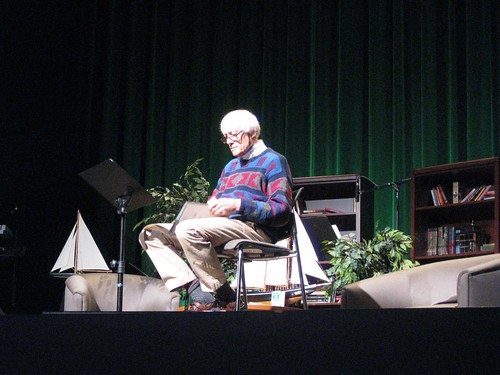
Not knowing much about Walter Wink, I didn’t really know what to expect. In the introduction, it was said that because of his health, it’s been difficult for him to attend these types of gatherings and it was special that he was able to come today. That was affirmed by those around us with nodding heads, polite cheers and light clapping.
It’s cool to like the old guy whose spent decades writing and teaching ideas that inspire so many. It’s similar to cheering for the MLB player who performed so well but never won that World Series (because he played in Boston. Yes, I am talking about Wade Boggs, the first former Red Sox player that I saw with my own eyes as not having horns). Anyway, here I am a week later still cheering for this gentlemen. He had a kind voice but despite his health, it wasn’t weak. I appreciated his inflections as he read his lecture and you could sense the heart behind it.
The lecture opened with he and his wife reading a fable about being citizens that the king has commanded to slay the beast and bring back a claw. The citizens represented by Walter says that the king is a liar, the beast has no claws and cannot be killed, thus he killed the king. But when he did that, the beast was still among them. They put a doll on the throne but still the beast was there.
That became the theme of the lecture. The beast is in the powers and the powers must be redeemed. For we all deal with the powers (and are a part of them).
I’ve been thinking about this most of the week – what would the powers redeemed look like? My mind immediately goes to the utopias that movies have created. Sci-fi movies like Star Wars come to mind, but of course, movies like the Matrix have sober me from those images. One of my favorite parts Walter warned was, “…to focus on redeeming them leads to utopian disillusionment, their transformation takes place in the limits of their fallen natures”. I’ve been thinking about that.
Of course, I’ve also been thinking about what this would look like in the Church. (This post could get long). While I know the Church can never be perfect, what would it look like if we allow ourselves to be led by the Spirit in the hopes of redeeming it alongside our collective fallen natures? Indeed, indeed, many have been pursuing this. However there are times when I feel that some have interpreted the church’s mission as an island they are trying to get off, throwing as many people on the lifeboat as possible, picking up a few of the drowning along the way, and waiting for the divine coast guard to bring them aboard. Meanwhile the boat that crashed on the island can be repaired. It won’t be as perfect as it was when it was new, but certainly more effective than a lifeboat. (Yes, this illustration is the product of 5 seasons of Lost).
Seriously, what if we did try to fix the boat? Doing so while knowing though we have God’s calling and strength, we could not restore to its original wholeness. Has God not saved others like this before? Thinking about how the redemption of the powers in the Church can redeem society and the individuals and institutions contained within has been a worthy and motivating idea to reflect on. I hope to do more. Til then, I’ve updated the notes that Evan and I too here.






Recent Comments